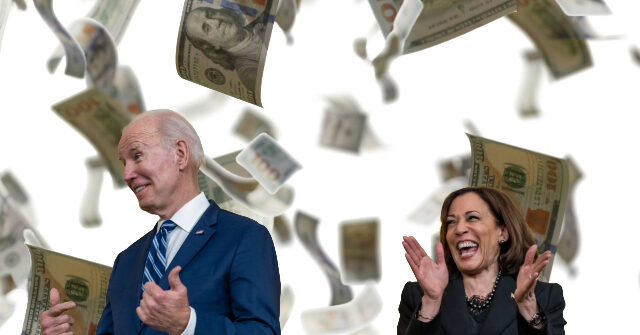In a recent interview aired on CBS’s “60 Minutes,” Vice President Kamala Harris defended her economic plan against claims that it would significantly increase the federal deficit by trillions of dollars. The questioning from correspondent Bill Whitaker focused on an estimation from the nonpartisan Committee for a Responsible Federal Budget, which projected a $3 trillion addition to the deficit over the next decade due to her proposals. In her response, Harris cited supporting economists who believe her economic strategy would bolster the American economy, contrasting it with her opponent’s plan, which she claimed would weaken it. Her emphasis was on the notion that investments in small businesses and the middle class are pivotal for economic strength, framing her proposal as one aimed at supporting the foundational elements of the U.S. economy.
Continuing the interview, Whitaker pressed Harris on the specifics of how she intended to fund her ambitious economic package. Harris reiterated her focus on the need for wealthier individuals to contribute more in taxes, arguing against the current disparity where essential workers such as teachers, nurses, and firefighters end up with a higher tax burden than billionaires and large corporations. Her stance is that the wealthiest must “pay their fair share,” indicating a commitment to tax reforms that aim to achieve greater equity in taxation. While she emphasized her vision of fairness, critics noted that this approach would still leave significant questions regarding the overall fiscal impact of her proposals.
Harris’s assertions regarding her economic plan present a vision geared towards fostering economic growth by prioritizing small businesses as critical to the national economy. She highlighted the role of small businesses in creating jobs and developing local communities, suggesting that investing in these entities is essential for revitalizing the economic landscape. By positioning her approach as one that strengthens the middle class, Harris attempts to create a narrative that promotes long-term economic health rather than short-term fiscal concerns. However, the conflicting views on the potential outcomes of her plan raise important debates about its viability and effectiveness.
The interview encapsulates a broader conversation about fiscal responsibility and social equity within the context of a presidential campaign. Harris’s focus on raising taxes on the wealthiest Americans aligns with progressive economic philosophies that advocate for increased taxes on high earners to fund public services and bolster the social safety net. This argument, however, faces challenges, especially in a political landscape that often prioritizes tax cuts as a means to stimulate economic activity. The divergence of viewpoints regarding budgetary impacts reveals the deep ideological divide over economic strategy in contemporary politics.
As the presidential race heats up, Harris’s emphasis on economic justice and equitable tax contributions is likely to resonate with a significant portion of the electorate concerned about income inequality and the fairness of the tax system. Nevertheless, opposition voices remain vigilant, questioning the sustainability of her proposed spending and the repercussions of increased taxation on the very businesses and individuals she aims to support. This tension between ambition and practical execution underscores the complexity of crafting a comprehensive economic strategy that seeks to address long-standing disparities while fostering an environment conducive to growth.
In conclusion, Vice President Kamala Harris’s recent interview illustrates the critical junction at which economic philosophy and political strategy meet in the context of her presidential campaign. While she advocates for a vision that champions small businesses and aims to rectify tax imbalances, skepticism about the feasibility and implications of her plans persists among economists and political opponents alike. As the campaign progresses, these conversations will be crucial in shaping public perceptions, especially among voters weighing the implications of increased government spending against the backdrop of national debt and deficits.

